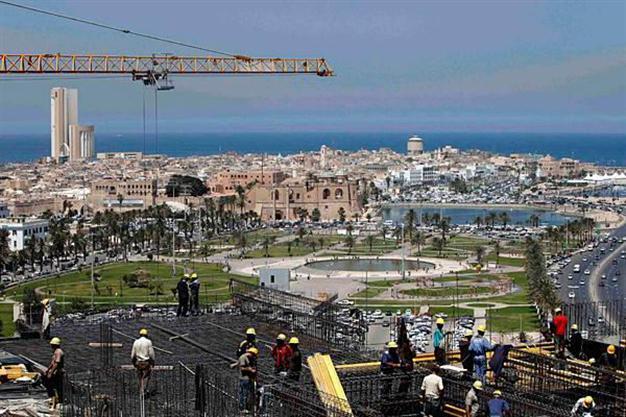Libyan gov’t to exclude Turkish companies from contracts
BENGHAZI

Turkish companies’ ongoing projects worth around $15 billion were halted in 2011.
Libya’s internationally-recognized government plans to exclude Turkish companies from contracts, a cabinet statement has said, effectively banning them from the oil producer, as Reuters reported today.The government of Prime Minister Abdullah al-Thinni gave no reason for the move but has in the past accused Turkey of receiving officials from a rival government controlling western Libya.
Al-Thinni and the allied-elected parliament have been confined to a rump state in the east since an armed group called Libya Dawn seized the capital Tripoli, reinstated a previous assembly and set up a rival administration.
“The council of ministers ... decided to review all contracts with foreign companies in all areas and exclude Turkish firms from operating in Libya,” the statement posted late on Feb. 22 on the cabinet website said.
A Turkish official told Reuters the government was evaluating the situation in the North African state, where Turkish businesses have traditionally had a strong presence.
Last week, al-Thinni warned Turkey of possible measures which could be taken against Turkish companies due to what he described as Turkish “interference” in Libya’s affairs.
This interference, al-Thinni said at a press conference, “negatively impacts Libya’s security and stability.”
“So far, Turkey’s stance has not been correct and we will be forced to take measures against it. At the end of the day, Turkey will lose because Libya can deal with any other country and Turkish firms are the ones who will lose their investments in Libya,” he said in an interview to El-Şark El-Evsat on Feb. 18.
Turkey will be forced to take “necessary measures” if this attitude does not change, Turkish Foreign Ministry spokesman Tanju Bilgiç said in a written statement on Feb. 19, replying to al-Thinni’s remarks.
“We expect interim government officials to review their irresponsible attitude and avoid hostile and baseless statements against our country. Unless they change their attitude, we will have to take the necessary measures,” Bilgiç said.
Bilgiç said his country’s support for Libya since the Feb. 17, 2011 revolution had always been clear, especially in the form of Turkish support for Libya’s reconstruction efforts and the development of the country’s state institutions.
Turkish companies’ ongoing projects worth around $15 billion were halted in 2011. Some of the companies’ construction sites were raided and the workers fled back to Turkey. Several Turkish companies have applied to international courts to compensate their losses.
In its latest performance report, the Turkish Contractors Association (TMB) said the total value of the projects completed in 2014 was quite low compared to the last two years.
“This situation is thought to be mainly explained by political and economic difficulties recently experienced in North African, Middle Eastern and Eurasian countries, which are the most important markets for the Turkish contractors. Especially unfavorable developments in Iraq and Libya, which have always been among the top markets for Turkish contracting companies, are thought to be the main reason for this decline,” the association said.
















